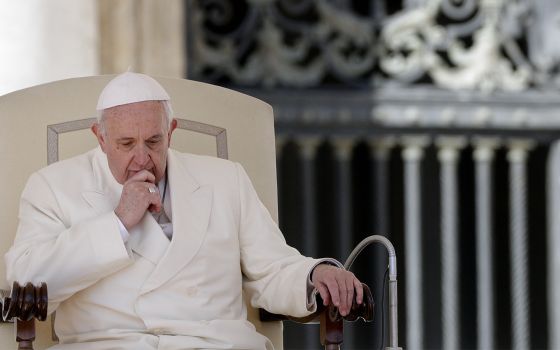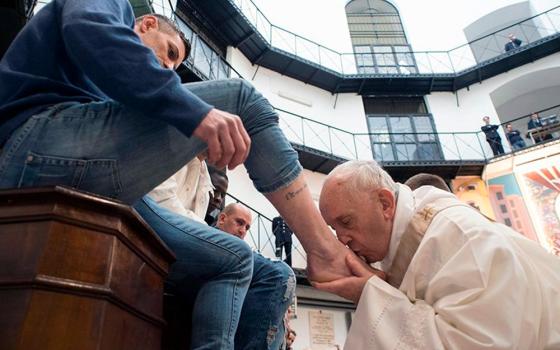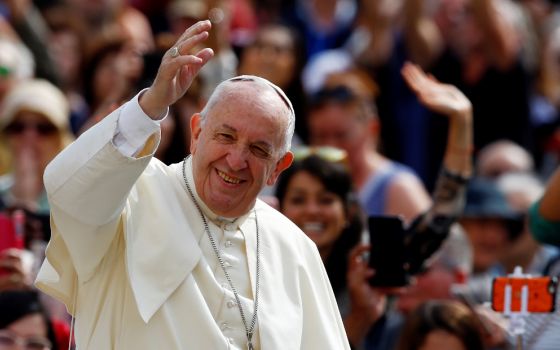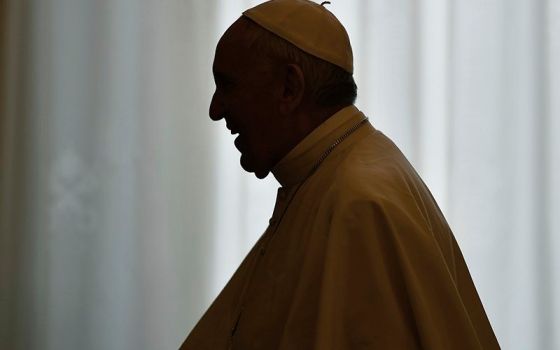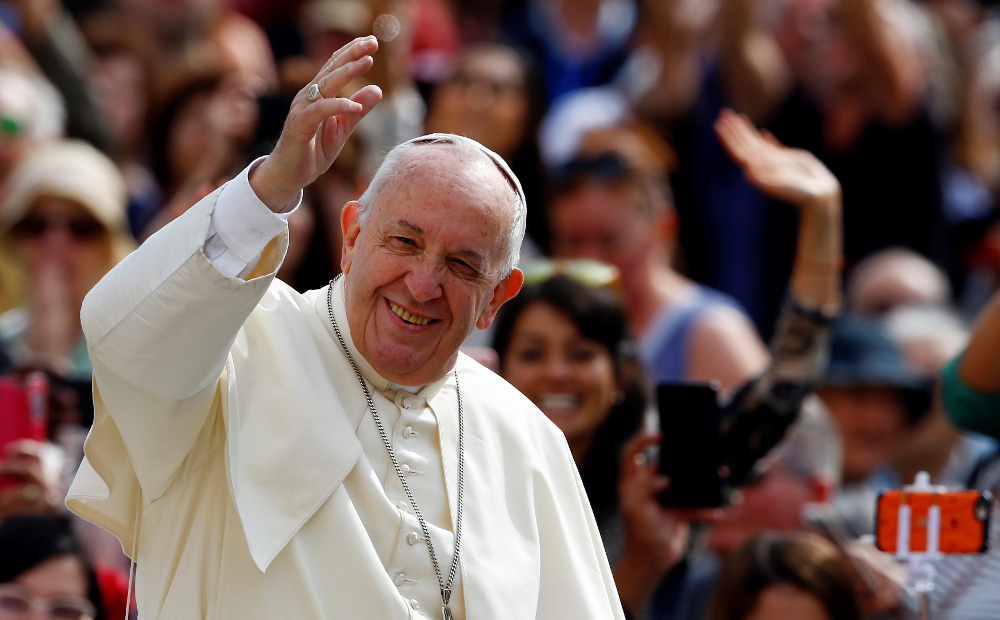
Pope Francis arrives to lead his general audience in St. Peter's Square at the Vatican May 2. (CNS/Reuters/Stefano Rellandini)
As a spiritual guide to those seeking to be better Christians, Pope Francis recognizes that many are tempted to follow the wrong paths to holiness. These are not bad people following the path of sin, but good people getting lost in the woods without a map. Francis believes that it is especially important to warn Christians of two false paths to holiness.
In Chapter 2 of Gaudete et Exsultate, an apostolic exhortation released in March, Francis explains that these are not new temptations. Christians through the centuries have been so tempted, and spiritual writers have labeled these false paths Gnosticism and Pelagianism. These are old temptations repackaged for a new age.
In Gnosticism, perfection is measured by information and knowledge or by some special experience, not by one's charity. The Gnostic takes pride in understanding everything, in having special knowledge.
"Gnostics think that their explanations can make the entirety of the faith and the Gospel perfectly comprehensible," explains Francis. "They absolutize their own theories and force others to submit to their way of thinking." They "reduce Jesus' teaching to a cold and harsh logic that seeks to dominate everything."
Francis considers Gnosticism one of the most sinister ideologies because, "while unduly exalting knowledge or a specific experience, it considers its own vision of reality to be perfect." Gnostics "domesticate mystery" and think they know everything.
"When somebody has an answer for every question, it is a sign that they are not on the right road," according to Francis. "God infinitely transcends us; he is full of surprises," explains Francis. "Someone who wants everything to be clear and sure presumes to control God's transcendence."
The Gnostics' conviction that they alone have the truth leads them to claim that their way of understanding the truth authorizes them to exercise a strict supervision over others' lives.
Francis, on the other hand, believes that "in the church there legitimately coexist different ways of interpreting many aspects of doctrine and Christian life." Our understanding and expression of doctrine "is not a closed system, devoid of the dynamic capacity to pose questions, doubts, inquiries."
He cites Pope John Paul II, who warned of the temptation on the part of those in the church who are more highly educated "to feel somehow superior to other members of the faithful." Gnostics can think that because they know something, or are able to explain it in certain terms, that they are already saints, perfect and better than the "ignorant masses."
While Gnostics take pride in their knowledge, Pelagians take pride in their personal efforts. Gnostics stress the intellect, while Pelagians stress the will.
Pelagians "ultimately trust only in their own powers and feel superior to others because they observe certain rules or remain intransigently faithful to a particular Catholic style," reports Francis.
While Pelagians speak of grace, it is often just an add-on to the all-powerful human will.
"When some of them tell the weak that all things can be accomplished with God's grace," writes Francis, "deep down they tend to give the idea that all things are possible by the human will, as if it were something pure, perfect, all-powerful, to which grace is then added."
Rather, "in this life human weaknesses are not healed completely and once for all by grace," Francis explains. "Grace, precisely because it builds on nature, does not make us superhuman all at once."
Not acknowledging our limitations "prevents grace from working more effectively within us," he writes. "Unless we can acknowledge our concrete and limited situation, we will not be able to see the real and possible steps that the Lord demands of us at every moment, once we are attracted and empowered by his gift."
Francis reminds us that "The Church has repeatedly taught that we are justified not by our own works or efforts, but by the grace of the Lord, who always takes the initiative." We cannot buy God's friendship with our works, "it can only be a gift born of his loving initiative."
This truth should affect the way we live. It invites us "to live in joyful gratitude for this completely unmerited gift" of his friendship. We can only celebrate this free gift if we realize that our earthly life and natural abilities are his gifts.
Yet some Christians today seek justification through their own efforts. "The result is a self-centered and elitist complacency, bereft of true love," writes Francis. "This finds expression in a variety of apparently unconnected ways of thinking and acting: an obsession with the law, an absorption with social and political advantages, a punctilious concern for the Church's liturgy, doctrine and prestige, a vanity about the ability to manage practical matters, and an excessive concern with programs of self-help and personal fulfilment."
Advertisement
Rather than spending their time and energy on these things, Christians should let themselves be led by the Spirit in the way of love. If the church does not follow the promptings of the Spirit, it "can become a museum piece or the possession of a select few," says Francis. "This can occur when some groups of Christians give excessive importance to certain rules, customs or ways of acting. The Gospel then tends to be reduced and constricted, deprived of its simplicity, allure and savor."
This form of Pelagianism explains why groups, movements and communities so often "begin with an intense life in the Spirit, only to end up fossilized or corrupt," writes Francis. "Once we believe that everything depends on human effort as channeled by ecclesial rules and structures, we unconsciously complicate the Gospel and become enslaved to a blueprint that leaves few openings for the working of grace."
The way to avoid these wrong paths, says Francis, is by reminding ourselves of the primacy of the theological virtues, the center of which is charity. What truly counts, according to St. Paul, is "faith working through love" (Galatians 5:6). Or as Paul says elsewhere, "The one who loves another has fulfilled the law … for love is the fulfillment of the law" (Romans 13:8, 10).
Francis reminds us how Jesus showed us the face of God "in every one of our brothers and sisters, especially the least, the most vulnerable, the defenseless and those in need." Loving our Lord and our neighbor is what Christianity is all about, a point missed by Gnostics and Pelagians alike.
Francis ends Chapter 2 with a prayer: "May the Lord set the Church free from these new forms of Gnosticism and Pelagianism that weigh her down and block her progress along the path to holiness!" He asks each of us to reflect and discern how these aberrations may be present in our lives.
[Jesuit Fr. Thomas Reese is a columnist for Religion News Service and author of Inside the Vatican: The Politics and Organization of the Catholic Church.]




